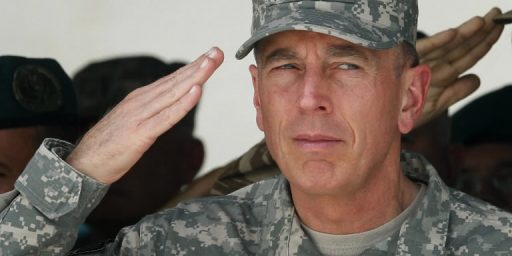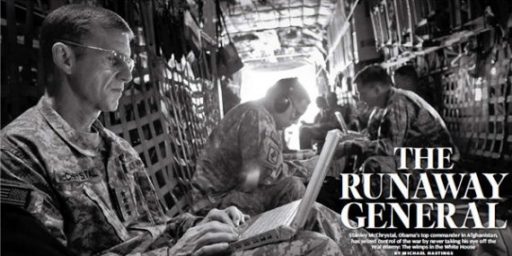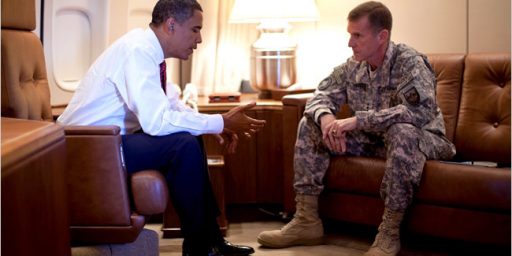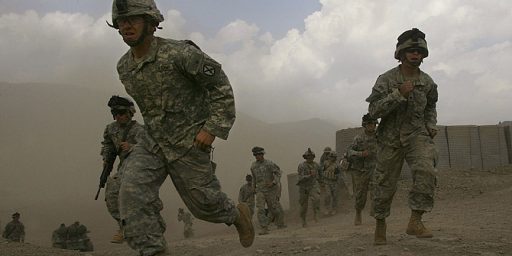Obama vs. the Generals
I’m vacationing in Ixtapa, Mexico this week and have been mostly ignoring the news since Friday afternoon. Via memeorandum, I see that the underground fight between General Stanley McChrystal and the Obama administration that I blogged on last week has kicked into high gear and that a new player has joined the fight: General David Petraeus.
Alex Spillious of The Telegraph reports under the headline “Barack Obama furious at General Stanley McChrystal speech on Afghanistan” that,
According to sources close to the administration, Gen McChrystal shocked and angered presidential advisers with the bluntness of a speech given in London last week. The next day he was summoned to an awkward 25-minute face-to-face meeting on board Air Force One on the tarmac in Copenhagen, where the president had arrived to tout Chicago’s unsuccessful Olympic bid.
Gen James Jones, the national security adviser, yesterday did little to allay the impression the meeting had been awkward. Asked if the president had told the general to tone down his remarks, he told CBS: “I wasn’t there so I can’t answer that question. But it was an opportunity for them to get to know each other a little bit better. I am sure they exchanged direct views.”
An adviser to the administration said: “People aren’t sure whether McChrystal is being naïve or an upstart. To my mind he doesn’t seem ready for this Washington hard-ball and is just speaking his mind too plainly.”
[…]
Some commentators regarded the general’s London comments as verging on insubordination. Bruce Ackerman, an expert on constitutional law at Yale University, said in the Washington Post: “As commanding general, McChrystal has no business making such public pronouncements.” He added that it was highly unusual for a senior military officer to “pressure the president in public to adopt his strategy”.
A piece by Scott Wilson in today’s WaPo continues that theme under the more benign headline “McChrystal Faulted On Troop Statements.”
National security adviser James L. Jones suggested Sunday that the public campaign being conducted by the U.S. commander in Afghanistan on behalf of his war strategy is complicating the internal White House review underway, saying that “it is better for military advice to come up through the chain of command.”
[…]
A U.S. military official said Sunday that Pentagon leaders were alerted that McChrystal was speaking in London and were not concerned by his remarks. “General McChrystal was simply speaking to the situation on the ground as he sees it and how he would execute the president’s current strategy — the mission he has been assigned,” said the official, who spoke on condition of anonymity to discuss a sensitive internal matter. “He was not pushing his views or in any way trying to influence policy.”
As I noted last week, I both think McChrystal has exactly that defense — he’s just defending his mission as it was outlined to him when he took the job a mere three months ago and yet went too far — intentionally putting his commander-in-chief in an awkward position knowing damned well that the policy is under serious rethinking within the administration.
This gets even more complicated, as Elisabeth Bumiller reports in a NYT story titled “Voice of Bush’s Pentagon Becomes Harder to Hear,” as Petraeus — the uber political general of this era — is a factor in this dispute.
Gen. David H. Petraeus, the face of the Iraq troop surge and a favorite of former President George W. Bush, spoke up or was called upon by President Obama “several times” during the big Afghanistan strategy session in the Situation Room last week, one participant says, and will be back for two more meetings this week.
But the general’s closest associates say that underneath the surface of good relations, the celebrity commander faces a new reality in Mr. Obama’s White House: He is still at the table, but in a very different seat. No longer does the man who oversees the wars in Iraq and Afghanistan have one of the biggest voices at National Security Council meetings, as he did when Mr. Bush gave him 20 minutes during hourlong weekly sessions to present his views in live video feeds from Baghdad. No longer is the general, with the Capitol Hill contacts and web of e-mail relationships throughout Washington’s journalism establishment, testifying in media explosions before Congress, as he did in September 2007, when he gave 34 interviews in three days.
The change has fueled speculation in Washington about whether General Petraeus might seek the presidency in 2012. His advisers say that it is absurd — but in immediate policy terms, it means there is one less visible advocate for the military in the administration’s debate over whether to send up to 40,000 additional troops to Afghanistan.
[…]
How much General Petraeus’s muted voice will affect Mr. Obama’s decision on the war is unclear, but people close to him say that stifling himself in public could give him greater credibility to influence the debate from within. Others say that his biggest influence may simply be as part of a team of military advisers, including General McChrystal and Adm. Mike Mullen, the chairman of the Joint Chiefs of Staff. The men are united in what they see as the need to build up the American effort in Afghanistan, although General Petraeus, who works closely with General McChrystal, said last week that he had not yet endorsed General McChrystal’s request for more troops.
Back when an unpopular President Bush was hanging his defense on the war on the prestige of his top general in the theater, I warned of Petraeus Fetishism. While I continue to respect and admire the general, it violates every tenet of our system to have the generals making strategic policy decisions. The president and his team should make those calls — preferably with the input of the Joint Chiefs and appropriate theater commanders, who can advise them on logistics, timetables, and matters of feasibility — and the generals should then be left alone to run the tactical level operations within the broad parameters of the assigned political objectives. And that’s just as true in periods, like the current one, when the president is someone for whom I did not vote.






I’d like to associate myself with every word of this post.
Don’t drink the water.
I hope you brought a couple dozen immigrants down with you to send them back to where they belong.
Watch out at the airport, they tend to try and slither into your luggage for a trip to the land of freedom.
Or the coolaid.
And while you traverse in the homeland of the donkey pole, remember were you come from so you can represent, err, I mean portray your self as a true American statesmen….
http://www.youtube.com/watch?v=-xEzGIuY7kw
Have a good vacation with the money you erned and saved up while baby sittting us….
It strikes me as odd or unfortunate that Jones wasn’t at the meeting between Obama and the General. I assume that’s because the trip was billed as an Olympics promotion, but your NSA is the person you want involved in meeting to bridge these types of policy divides.
Does anybody else suspect that James and his family are secretly en route to Honduras in spite of the Pelosi boycott?
War is too important to be left to the generals, or was that the politicians?
Bernard, could you expand on that?
And specifically, both Bernard and James (and I confess I’m showing my ignorance here), I recall any number of ex-military commenting on foreign policy during the Bush administration. It made for nightly fodder in the MSM and cable chat shows.
Has one lost their right to free speech just because they remain in government employment? Or should the standard be: exercise your right at the risk of being fired?
James
I agree with you that the President should be the top decision maker but to say that generals shouldn’t be involved in strategic decisions is crazy. The President should decide if we go to war but once done should limit himself in the prosecution of that war and let the professional conduct the war. Politicians who get down into the weeds in conducting a war usually screw it up.
We have had two Generals saying they need pretty much the same thing and from my understanding some changes in the ROE. Yes it is the President’s final decision but it would be foolish to ignore the professionals. The president can cut and run to but needs to take responsibility for that decision. I have not seen this President take any responsibility for anything that is negative.
Someone should ask Eric Shinseki these questions…
I couldn’t help but think of William Westmoreland as I read that sentence…
Should Admiral Nimitz have had a good deal of say in if we have fought at the Battle of Midway which was a strategic decision and what resources to throw at or should he not have been involved and rely on the President expertise to come up with a decision?
AIP
You do have a point but like football you have to go with the record of the coach as successful or not. An owner who tries to go onto the field and coach almost always screws it up. A good coach can fail if he doesn’t have the other pieces including backing from the owner. An owner who thinks he can coach because he is the final decision maker is foolish. If the owner hires a coach who has proven to be successful many times then he needs to listen to him\her on what they need to win not pull a “I know better attitudeâ€.
AIP
As for Westmoreland, surely you don’t want to get into discussion on the failure to win in Vietnam because that blame fall a great deal more to what the politician, MSM and liberals did than anything the military did.
re: Wayne | October 5, 2009 | 08:40 pm
Yes of course, because making U.S. military and foreign policies is just so much like owning/running a sports team…such a brilliant analogy…
re: Wayne | October 5, 2009 | 08:47 pm
Oh pardon me, Westmoreland was right that we should have escalated the war in Vietnam…this, despite the fact that most of the American people steadily turned against what was a civil war we had no business fighting in the first place…
Generals should be consulted. Privately.
I’m a little leery of retired generals speaking out but they are more-or-less private citizens. (It’s slightly complicated because of the nature of retirement pay and generalship.) Active duty officers have very much stricter guidelines.
An interested party. You ever hear of SEATO? Do you know South Viet Nam was a separate country from North Viet Nam? Do you know communists from the north invaded the south for the purpose of conquest? If you are correct then we should have never fought in Korea. If you like communism so much I would suggest moving to a nation which endorces that failed system. However, you could just wait here as we have a President who is a communist and intends to impose it on us.
Well, hopefully you will be one of the first to be rounded up by the secret police and then carted off to the gulag…
Wayne- The only issue I have with your football analogy is that the objective in sports is obvious – to win. I’m still not sure we have a clear objective for Afghanistan right now.
Franklin
You have a point about defining “wins†in a political or even in a Country best interest sense is difficult. However military wise a win is destroying the opponents will and\or ability to fight. War is the ultimate breakdown of diplomacy. Once war breaks out, military objectives are the goal. Once you have make significant progress in that area then you can get back to diplomacy. Too many try to rush to the end game without playing out the process often for the purpose of moral appearance. That strategy simply doesn’t work.
I have my own reasons that I have explain before about believing we shouldn’t have been in Vietnam. That said, if the purpose was to win, then Westmoreland approach was much better than what we did. You seldom win wars walking on eggshells. Most of the mistake had little to do with decision by the military commanders. The Tet Offensive was a great military victory for the US but the MSM, liberals and politicians turn it into a great propaganda victory for the North Vietnamese.
The military will not lose the war in Afghanistan but the Politicians, MSM and American people might. If we want the military to win, get out of the way and let them. Otherwise bring them home and accept the responsibility when we get attack many times again.
My my, how much that sounds like the rationale for why we couldn’t leave Vietnam…that doing so would cause a domino effect as country after country in SE Asia would fall to the Communists…funny how that didn’t happen…it is such a pity that we don’t live in a military dictatorship…then we wouldn’t have to worry about the pesky American people deciding when we should end military conflicts…
How many times did North Vietnam attack the US before we got involved?
I suppose you think we should have stayed out of WWII?
American people should be free to make up their own minds. However they need to take responsibility for their decision and influences. For those that demand to eat their cake and have it to, it needs to be pointed out to them how unreasonable and unrealistic they are being.
Serving generals and ex-generals are completely different, and should be treated as such.
Shinseki saying we need more troops is also completely different from McChrystal trying to dictate strategy. If McChrystal wants to say he need 40,000 more troops to do his mission, I’d prefer he say it privately or in response to a Congressional Committee (as in the case of Shinseki), but that is a legitimate statement by a theater commander.
What McChrystal did was the equivalent of if Shenseki has said, “the invasion of Iraq is a bad idea and because we can contain Saddam.”
The difference with the other cases people cite are simple: Strategy vs. resourcing of strategy, retired vs. active duty.
I am
“I’d prefer he say it privately or in response to a Congressional Committeeâ€
That is a bit hard since the democrats refused to bring in McChrystal to testify to Congress like McCain and many Republicans are asking for. Amazing how Congressional oversight was so important when a Republican was President but not when a Democrat is President.
Considering that we got involved just as the French were leaving, the answer to your question is zero…
Not at all…of course, it is rather foolish to compare the Vietnam War to WWII…
Nice false argument…what exactly is the goal in Afghanistan? What exactly constitutes “winning” there? Let’s say we completely destroy the Taliban…what’s to stop al-Qaeda from setting up shop elsewhere? Hell, they are more concentrated in Pakistan than Afghanistan anyway…should we be taking the fight to Pakistan, a supposedly friendly ally? I love how so many armchair generals try to scare everyone else into thinking that we simply cannot end military conflicts, even if they are clusterfu*ks like Afghanistan, because if we do, some scary bogeyman will come and get us…if the primary objective is to defeat al-Qaeda, then we should be doing that, not trying to prop up failed nation states…
What false argument? People want to destroy al-Qaeda but don’t want violence or to offend anyone. They don’t want Afghanistan to be safe haven (which is our goal) but don’t want to do what is required to make that happen. They want an uncorrupt Afghan Government but don’t want to remove those corrupted because it will upset the cart.
The “we can’t stop it completely so why try†is an asinine argument. We can’t stop murder or another meth lab from happening either. Should we not try? Of course we should. We can’t stop all but we can greatly impede it. Same goes with terrorist safe havens. We can eliminate some and limit others. I prefer a world with a few small untrained and ill equip terrorist groups than one with many large well equip and well train ones.
You should have clarified what you meant in your original comments…who are all these people who want to destroy al-Qaeda but don’t want violence? What most people probably don’t want is a murky, undefined mission in Afghanistan that unnecessarily harms our troops without achieving the goal of destroying al-Qaeda…when and where has nation-building ever worked in a place like Afghanistan?
Go back and read commentaries and post during the Bush years. There are many examples of statements like “violence only causes more violence†and “if we kill one terrorist it will result in 10 more popping up to take his place.
How about Columbia, Honduras and Iraq? We can go back further to the Roman Empire and Chinese Dynasty where they took land over and built several civilization up. Oh wait, I know Afghanistan is different from everywhere else.
Certainly some people have made that argument but you are confusing two different issues…one can be for defeating al-Qaeda and also wonder if what is currently going on in Afghanistan is the best way to achieve that goal…not everyone who thinks that Afghanistan is turning into a clusterfu*k also ascribes to the views you cited…and if you are so keen to look at history, let us look at the experiences of the British and the Russians in Afghanistan…